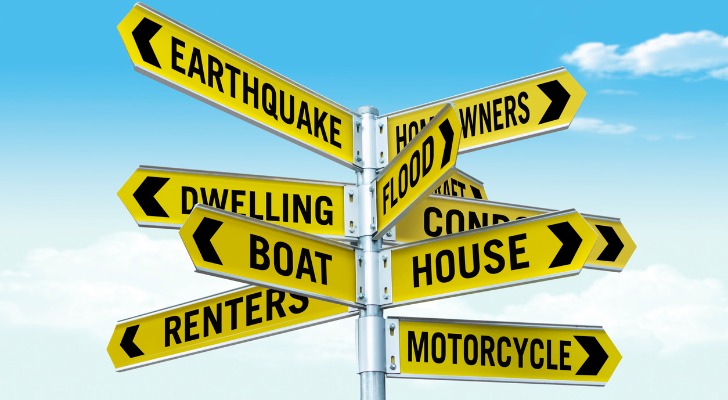There are a lot of different types of insurance choices and it can be difficult to determine which ones you should get. Many have costs that are only increasing, making it even more difficult to choose the insurance types that fit into your budget. Going without some of the most important types of can end up costing you, or your family, more in the long run than paying for the monthly or yearly costs. Let’s take a look at the eight of the most popular types of insurance that people buy.
Choosing the best insurance for you is an important financial decision, so consider consulting a financial advisor to help you make a wise choice.
Health Insurance
The U.S. spends more on healthcare than any other country, and that makes health insurance a must for most people. Even if you are healthy and don’t usually need medical care, not having a health insurance plan makes your finances highly vulnerable. Just one unexpected trip to the emergency room could lead to financial peril.
If you are worried about the cost of health insurance, you can opt for a plan with a higher deductible, such as a high-deductible health plan (HDHP). You can also keep costs down by visiting in-network providers when you need medical care. The costs of paying for health insurance almost always outweigh the financial impact of paying for even some of the most simple surgeries or emergency room visits.
Auto Insurance
Auto insurance covers the potential financial impact of damage to your car, or damage you cause as a driver. Most states require at least liability auto insurance, but you might need more coverage. For example, if you are financing or leasing your vehicle, you will likely be required to have full coverage.
Even if you own your car outright, you might still want more than just liability coverage. Comprehensive coverage helps if your car is damaged by weather or an animal. Collision coverage reimburses you for costs if your car is damaged in an accident. There are plenty of auto insurance options that you may want to consider depending on your driving history, where you live or where you keep your car every day.
Life Insurance
Life insurance is less about protecting you and more about protecting your loved ones, as it provides a payout in the event of your death. It can help cover final expenses after you pass away as well as outstanding medical bills and other debts. If you think these costs could be high and they will be a burden for your family, a life insurance plan could be a wise investment.
Life insurance can also be a good investment to either protect your family financially if they currently depend on your income or you could get a cash value policy that you could benefit from while you’re still living. Life insurance is one of many things that you should consider as part of your overall financial plan.
Homeowners’/Renters’ Insurance
Homeowners‘ and renters’ insurance cover similar losses, which are generally cases where your possessions are damaged or destroyed due to vandalism or fires. You’ll also be covered if your belongings are stolen. This is an insurance that is required by many landlords or mortgage companies, depending on your housing situation.
Keep in mind that these policies usually do not cover damage caused by flooding, hurricanes or earthquakes. These disasters require separate policy riders, or separate insurance coverage altogether, which you should consider purchasing if you live in an area that is prone to any of them.
Natural Disaster Insurance
There isn’t natural disaster insurance that covers all natural disasters in a single policy, but you can get specific insurance to cover floods, hurricanes, earthquakes or other natural disasters. According to the Insurance Information Institute, just one in 10 Americans have flood insurance. But this type of insurance is important if you live in an area prone to flooding.
These policies cover damage caused by flooding, including hurricane-related storm surges and flooding. However, you might need separate hurricane insurance if your area is prone to them. Similarly, earthquake insurance covers damage directly caused by the earthquake. Indirect damage, such as fire damage, is covered by your homeowners’ insurance. The type of insurance you need to cover potential natural disasters will depend on where you live.
Long-Term Disability Insurance
This type of insurance can cover lost income if you are unable to work for a long time. Even if you are not currently working in a physically dangerous job, you never know what could happen in the future. Hence, if you don’t have significant savings you can draw from if you find yourself unable to work, long-term disability insurance can help. And there is also short-term disability insurance, which can help if you are unable to work for three to six months.
Identity Theft Insurance
Identity theft may not seem like a major threat until it happens to you. According to the Federal Trade Commission, approximately 9 million Americans have their identities stolen every year. If you end up as part of that statistic, this kind of policy can help. Specifically, it reimburses you for some of the costs related to reclaiming your identity and repairing your credit reports. Even if you are careful about protecting your identity, this kind of policy is a good way to protect yourself financially.
Umbrella Insurance
As its name implies, umbrella insurance is a bit of a catch-all that covers different scenarios not covered by other insurance policies. For example, if you are involved in an auto accident and the resulting medical bills and repairs exceed the coverage provided by your auto insurance policy, an umbrella policy might help pick up the tab. In the same way, umbrella insurance can help with excess costs for your homeowners, property or renters insurance policies.
Bottom Line
There are all kinds of insurance policies to help protect you against all different types of unexpected financial obligations. The choice to buy other types of insurance largely depends on your situation. For example, you obviously don’t need auto insurance if you don’t have a car. Other policies, like identity theft and umbrella insurance, are not as critical but can still be a good idea. Again, the right choices for you depend on your situation and your unique needs.
Tips on Buying Insurance
- Buying insurance is a tough financial choice and many available options are chosen to protect your financial future. You can speak with a financial advisor who can help make the decisions more informed and make sure your insurance choices fit into your larger financial plan. Finding a qualified financial advisor doesn’t have to be hard. SmartAsset’s free tool matches you with up to three financial advisors who serve your area, and you can interview your advisor matches at no cost to decide which one is right for you. If you’re ready to find an advisor who can help you achieve your financial goals, get started now.
- Insurance generally has different levels of coverage, and you can usually pay higher premiums so you pay less when you file a claim. But it’s not always easy to know how much insurance you need. SmartAsset’s life insurance calculator can help you estimate how much coverage you need.
- Most of the time, insurance premiums will be the biggest cost that comes with your policy. Learn more about the topic to help you understand insurance premiums as well as how to lower your costs.
- Life insurance doesn’t have to be expensive. Get a life insurance quote and pay as little as $8 per month for $250,000 of coverage.
Photo credit: ©iStock.com/skynesher, ©iStock.com/Brothers91, ©iStock.com/gerenme


